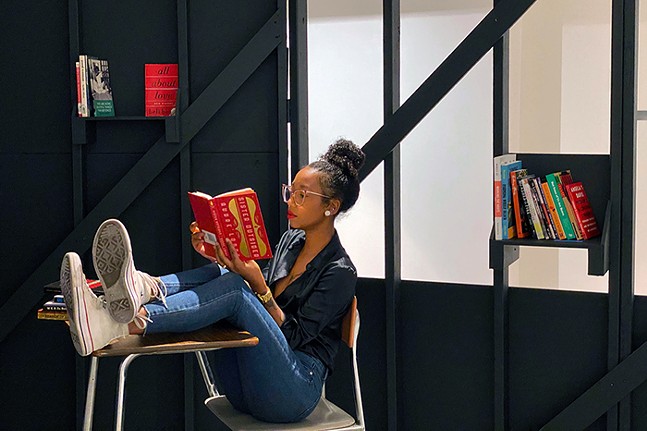A Pittsburgh-based artist has adapted these scientific terms into an art exhibition meant to bridge the gap between Black artists in Pittsburgh and beyond.
The Black box test originally opened in November 2021 at the August Wilson African American Cultural Center. Curated by artist Jessica Gaynelle Moss, it invites people who identify as Black, African American, African, Caribbean, Afro-Latinx, or of the African diaspora to engage with the art and the space.
The show will only be open to those groups mentioned, something Moss says is intentional.
“Early on in my experience, I identified a need for safe spaces created for and by Black people,” says Moss.
Featured artists include Mikael Owunna, Alisha Wormsley, and Shani Peters. The artists have also been participating in a series of virtual discussions moderated by Moss, with the next one happening on Fri., Jan. 21.
Moss’ varied educational and professional experience includes a BFA in Painting from Carnegie Mellon University, a Masters in Arts Administration Policy and Management from the School of the Art Institute of Chicago. She graduated from Pitt Law School in 2018.
While her path to art is unique in that sense, she still had the very common experience of having white people demand access to the safe spaces for Black people that she created.
“Historically, whenever Black people assemble it is often seen as a threat that must be monitored and controlled. The Charleston Massacre demonstrated that even our prayer and healing spaces remain targeted,” says Moss, referring to the 2015 mass shooting at the historic Emanuel African Methodist Episcopal Church. “Well-intentioned ‘inclusive’ and ‘POC’ spaces often result in the erasure of the Black experience. Black spaces continue to be vital for Black survival, resistance, and healing. Black voices need the space to be heard and preserved. Ultimately, Black Space equals Black Power.”

Photo: Courtesy of Jessica Gaynelle Moss
the Black box test at August Wilson African American Cultural Center
Moss says that the Black box test builds on scholarship she started when she was a graduate student at SAIC. There, she wrote a thesis titled “A Work In Progress: Looking Closely at Change” which consists of a written document, a digital anthology, and a proposal for a community-based interactive installation.
“By including the personal accounts and experiences of colleagues and professionals involved in the arts and culture, I aim to elicit strategies for facilitating radical change within the creative and cultural sector," says Moss. "This is a call to arms."
She says the staff at AWAACC have been incredibly supportive of the work, and that being able to showcase it in a facility named after one of the most celebrated American artists has been a powerful experience for her.
Moss cited a series of quotes that she feels encapsulates what she hopes viewers will take away from the exhibition, including one by the Combahee River Collective that reads, “If Black women were free, it would mean that everyone else would have to be free since our freedom would necessitate the destruction of all the systems of oppression.”
the Black box test. Continues through Mon., Jan. 31. August Wilson African American Cultural Center. 980 Liberty Ave., Downtown. Free. aacc-awc.org


